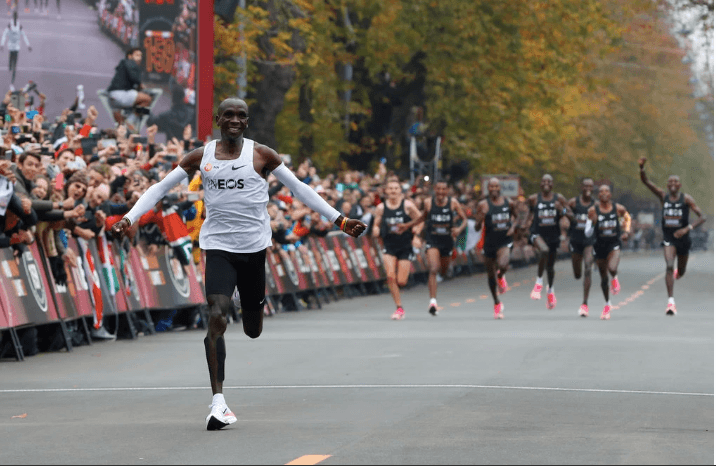
In Vienna, Eliud Kipchoge, the marathon world record holder, on Saturday shattered a record that had been untouchable. As a runner, this was something special for me.
I’ve run three marathons (Chicago 2018, Philadelphia 2018 and Phoenix 2019). It’s one of the hardest things I’ve ever done and one of the most rewarding. I haven’t accomplished my goal of qualifying for Boston, though I got close in February (3:20:13, and needed 3:19:10 to qualify and run the Boston Marathon).
His feat was running a marathon (26.2 miles) under two hours.
There is A LOT of application for all us in our professional career and business, starting with his quote:
“Anything is possible.” – Eluid Kipochoge, 10/12/2019
Breaking this record was insane. Some people call him the Roger Federer or Michael Jordan of running. No one has done this on any marathon course. None of the analytic gurus or race experts thought it could be done until much later.
“Just how likely was this? When researchers from Australia crunched data from marathon world records over the past 60 years, they concluded that there was a 10 percent likelihood that the two-hour mark would be fall in May of 2032, and just a 5 percent chance it would happen by 2024.”
There are some who are criticizing this as a “fake run.” To be fair, this wasn’t a sanctioned marathon. It was a course that was flat (but not downhill) and manufactured.
But for anyone that’s run a marathon and knows what it takes to complete one, this is anything, but fake.
If you look at Kipchoge’s history of running, you’ll also see his TOTAL domination of the sport.
“In actual races, Kipchoge continued to be unmatched. He now holds the official world record for the fastest marathon with his performance at the 2018 Berlin race, when his 2:01:39 finish shaved 78 seconds off the previous mark. He followed that up by winning his fourth London Marathon in April of 2019. That put his marathon win streak at 10 straight, including an Olympic gold in 2016.”
He’s also a great humanitarian.
“I wanted to run under two hours and show human beings can do a good job and lead a good life. It shows the positivity of sport,” Kipchoge said. “I want to make the sport an interesting sport whereby all the human beings can run and together we can make this world a beautiful world.”
Three main lessons I want to focus on:
First, like everything in life, there will always be critics. People will point to anything negative they can or “manufacture” their version of the truth.
Instead of replying back, Kipchoge is staying positive and focusing on how this can help others (and other runners). That’s how you can control the conversation. Otherwise, you play into your critics and get into a comparison discussion.
The key is to “swim in your lane.”
In this case, it’s comparing himself to other runners, race conditions, etc.
Second, it highlights how much WORK it takes to accomplish great feats. It took the greatest runner of all-time his entire life to be able to do this. Great feats take a long time. Professional success isn’t instant like an “ESPN highlight reel” and “social media” news feeds.
Think about the successes you are most proud of. They probably took years to accomplish when you look at your first-step and last-step.
Third, Kipchoge first attempt at sub-two hours failed. Nike made a documentary on it in 2017. It took him two-plus years to try again and be successful.
Rarely do we get this right on the first attempt. That goes for extraordinary athletes too. Failure and success are married. They are flip sides of the same coin. You can’t have one without the other.
In interviewing more than 1,000+ successful entrepreneurs, leaders and managers for my book, Social Wealth, I asked them a question. “How many things do you get right on the first attempt?” The average response was three. That means 70% of the things very successful business people do they fail at the first time. They also said he often took them multiple failures to find the right answers.
They had to learn to pivot, learn their lessons, implement them, and then succeed.
The most forward-thinking companies understand how to leverage failure. You can read up on what Google X does to incentivize individuals and teams to failure.
Harvard has shown through research that the most successful teams report more failures than other teams. That’s one of their “secret sauces.” By communicating failure, you actually progress much, much faster. Plus, you create psychological safety in the process, which creates the optimal environment for high performance.

